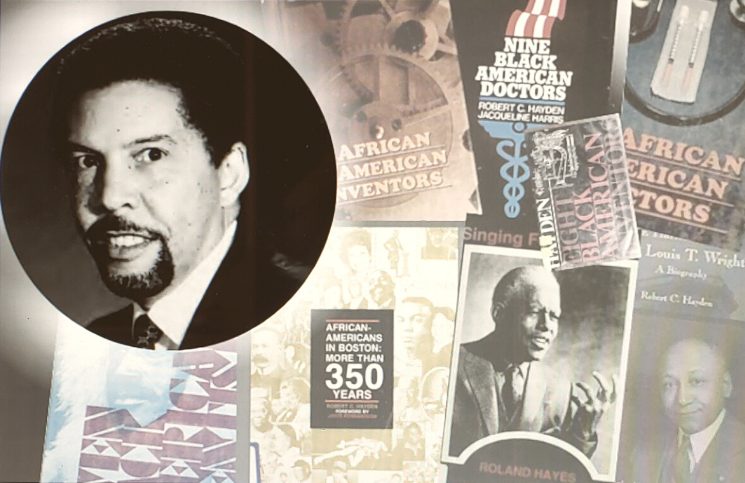Scholar, Educator, Historian, Activist
by Paula Paris
Black History Month 2022 coincides with a celebration of the life and works of scholar, educator, and historian Bob Hayden, who passed away on January 23 just thirteen days after his son Kevin was sworn in as Suffolk County District Attorney. A quiet, soft-spoken man, the full volume of Bob’s expression was projected through the voices of the multitude of individuals whose lives he chronicled in his oral histories and publications.
Bob Hayden had a distinguished career in Boston. He wrote a weekly column titled Boston’s Black History for the Bay State Banner; served as president of the Boston chapter of the NAACP; held the position of deputy superintendent for the Boston Public Schools; and was a director of METCO (Metropolitan Council for Educational Opportunity). Bob began his teaching career as a high school and middle school teacher, and later taught as a senior lecturer at UMass Boston, Boston College, Northeastern and Lesley Universities. He was a contributing writer for the Dictionary of American Negro Biography, the Encyclopedia of African American Culture and History, and the American National Biography. Inspired by a passion for telling stories, Hayden focused his research on lesser known or obscure figures and their contributions to history, especially ordinary New Englanders whose stories had never before been told. Bob shared their stories widely.
Bob’s maternal grandfather was a pullman porter. Between 1988 and 1989 Bob interviewed thirty-two railroad workers. Those oral histories are archived at UMass Boston and illustrated in a permanent exhibit at the Back Bay MBTA station called “The Knights of the Rail.” A prolific author, he published a series of volumes on African Americans in medicine and science. His three most notable books are rooted in the three places Bob called home over the course of his life: African American and Cape Verdean Americans in New Bedford: A History of Community and Achievement (1993); African Americans in Boston: More than 350 Years (1991); and African Americans on Martha’s Vineyard and Nantucket: A History of People, Places and Events (1999). Bob also created an ethnic heritage studies series at the Educational Development Center (EDC) in Waltham for urban school districts.
Bob always signed his name Robert C. Hayden. Until I read Bryan Marquard’s obituary of him in the Boston Globe, I never knew that Bob’s middle name was Carter. I couldn’t help wondering if the name was in honor of the noted educator and scholar Carter G. Woodson (1875 – 1950), known as the father of Black History Month. One of Bob’s daughters told me that Carter was actually a family name. I looked up a 2004 History Makers interview with Bob to learn that one of his great-aunts, Estelle Carter, was an avid historian. “She wrote history, spoke history, loved history and promoted it all over New Bedford,” Bob recounted.
Namesakes or no, Robert Carter Hayden and Carter G. Woodson were related in spirit through a deep mutual commitment to the research and publication of Black history. Woodson, the second African American to earn a PhD. from Harvard, established African American Studies as a legitimate academic discipline, although it would take many years to develop fully. He was committed to challenging the established dogma that Black people had no history other than enslavement. In 1926 Woodson initiated the celebration of Negro History Week during the second week in February to coincide with the birthdays of Frederick Douglass and Abraham Lincoln. In 1976 the celebration was expanded and formalized as Black History Month. However, Woodson firmly believed that education about Black history was not the work of just one month but a subject for perpetual lifelong learning. Woodson also viewed the study of Black history as part of the study of American and global history. “We should emphasize not Negro history, but the Negro in history,” he urged. “What we need is not a history of selected races or nations, but the history of the world….”
Woodson founded the Association for the Study of Negro (now African American) Life and History (ASALH) in 1915. ASALH’s mission is to promote, research, preserve, interpret, and disseminate information about Black life, history and culture to the global community. Seventy years later, carrying forward Woodson’s legacy, Robert Carter Hayden became ASALH’s national secretary and subsequently established the Martha’s Vineyard chapter of ASALH. Bob Hayden’s life’s work embodied this mission and provided its driving force.
Bob’s Globe obituary begins with his mantra, “Know Your History.” That is the legacy and the lesson that he leaves to posterity. As he taught us, knowing history is essential to understanding the present and advocating positive change for the future.
Paula Paris is Deputy Director of JFYNetWorks and a dedicated perpetual student of Black History.
Attribute, sources:
– Book cover thumbnails are a partial representation of Robert C. Hayden’s publications, archived at: https://archive.org/details/texts?query=robert%2Bc%2Bhayden.
– Picture of Robert C. Hayden, “African Americans in Boston: More Than 350 Years”, Author Bio page 188, http://vault.blackstonian.org/wp-content/uploads/2016/11/350africanamericansbostonunlocked.pdf. Digitized version made possible for Blackstonian Vault, The Information Archives through the generosity of Bank of Boston.
– Collage art courtesy of JPM
Other posts authored by Paula can be found here.
HOW ARE WE DOING? In our pursuit to serve up content that matters to you, we ask that you take a couple of minutes to let us know how we’re doing? Please click here to be navigated to our JFYNet Satisfaction Survey. Thank you!





